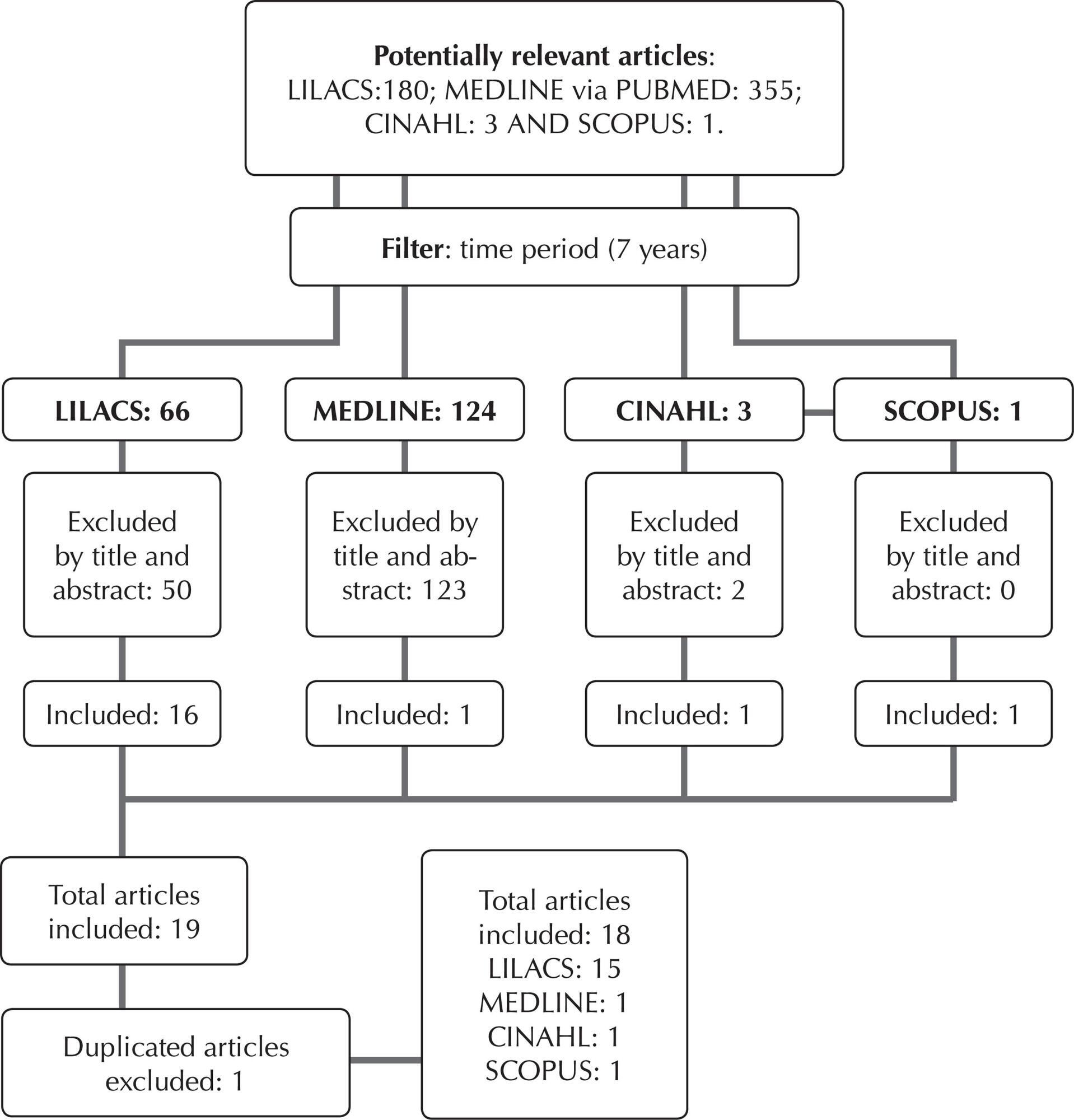-
ORIGINAL ARTICLE
Impact of an educational intervention on standard precautions during the COVID-19 pandemic
Revista Brasileira de Enfermagem. 2023;76(4):e20220750
09-04-2023
Resumo
ORIGINAL ARTICLEImpact of an educational intervention on standard precautions during the COVID-19 pandemic
Revista Brasileira de Enfermagem. 2023;76(4):e20220750
09-04-2023DOI 10.1590/0034-7167-2022-0750
Visualizações0ABSTRACT
Objective:
To evaluate the impact of an educational intervention on the knowledge of nursing professionals regarding standard precautions.
Methods:
This is an almost experimental study conducted with 100 nursing professionals. Data collection was performed using a sociodemographic characterization instrument and the Standard Precautions Knowledge Questionnaire. The educational intervention was based on five moments, where the approach to questions with less than 70% accuracy was intensified.
Results:
There was a significant difference between the scores of healthcare professionals before (16.20 ± 1.51) and after (16.90 ± 1.31) the educational intervention (W=3.336; p < 0.05). Regarding knowledge about hand hygiene after glove use, an increase in knowledge from 83% to 93% was obtained.
Conclusions:
A positive effect on the professionals’ knowledge was recorded, demonstrating advances regarding the strengthening of already acquired knowledge and the understanding of new knowledge.
Palavras-chave: Continuing Education in NursingKnowledgeNursingNursing ProfessionalsUniversal PrecautionsVer mais
-
ORIGINAL ARTICLE
Teaching-service integration: building the educational workshop in healthcare
Revista Brasileira de Enfermagem. 2019;72(2):375-382
04-18-2019
Resumo
ORIGINAL ARTICLETeaching-service integration: building the educational workshop in healthcare
Revista Brasileira de Enfermagem. 2019;72(2):375-382
04-18-2019DOI 10.1590/0034-7167-2018-0008
Visualizações0Ver maisABSTRACT
Objective:
To identify the pedagogical strategies and the elements that determine the construction of the educational workshop in healthcare at the teaching-service integration process.
Method:
Collective case study with qualitative approach. The cases consisted of two undergraduate courses in nursing. Thirty-one interviews were conducted with healthcare professionals, professors and students, in addition to participant observation in seven basic health units (UBS) that received the students interviewed.
Results:
The following analytical categories emerged: teaching-service integration: articulating idealized situations with real situations; pedagogical workshop in health: development of collective pedagogical actions; reflection on the experiences in the pedagogical workshop in health: articulating the knowledge of the work world with the teaching world.
Final Consideration:
Despite the integration difficulties between teaching and service, we can conclude that their encounter generates a fertile field for the development of the educational workshop in healthcare. To this end, the agreement of the strategies presented in the constitution of the workshop is necessary.

-
REVISÃO
Analysis of Brazilian publications on distance education in nursing: integrative review
Revista Brasileira de Enfermagem. 2018;71(1):214-222
01-01-2018
Resumo
REVISÃOAnalysis of Brazilian publications on distance education in nursing: integrative review
Revista Brasileira de Enfermagem. 2018;71(1):214-222
01-01-2018DOI 10.1590/0034-7167-2016-0454
Visualizações0INTRODUCTION Distance Education (DE) is characterized by a teaching-learning process in which the relationship between teacher and student does not occur on physical plane. This strategy, besides allowing the use of technologies in education, stimulates multidirectional communication and the exchange of experiences/knowledge among the related subjects, while always aiming at the student as protagonist and […]Palavras-chave: Continuing Education in NursingDistance EducationEducational TechnologyNursingNursing EducationVer mais
-
RESEARCH
Knowledge about precautions in Primary Health Care: tool validation
Revista Brasileira de Enfermagem. 2018;71(suppl 4):1589-1595
01-01-2018
Resumo
RESEARCHKnowledge about precautions in Primary Health Care: tool validation
Revista Brasileira de Enfermagem. 2018;71(suppl 4):1589-1595
01-01-2018DOI 10.1590/0034-7167-2017-0886
Visualizações0ABSTRACT
Objective:
To elaborate and validate a tool to assess knowledge and behavior of nursing professionals about standards and specific precautions in the Primary Health Care.
Method:
Methodological study of the elaboration and validation of the tool by thirteen experts judges, using a Likert scale of 4 points, with Content Validity Index ≥ 0.80, on clarity, relevance and pertinence.
Results:
A tool composed of 47 dichotomous questions to assess knowledge and 12 questions, with five options of answers, for the referred behavior. In the validation, only one item was deleted, related to the “Hands Hygiene” axis and one item was reformulated, regarding “Use of Common Gloves” and another 11 changed writing. The tool as a whole was assessed for relevance, comprehensiveness and representativeness within the scope of the topic investigated.
Conclusion:
The developed tool has been validated and is now available for use in Primary Health Care.
Palavras-chave: Continuing Education in NursingNursingPrimary Health CareUniversal PrecautionsValidation StudiesVer mais



